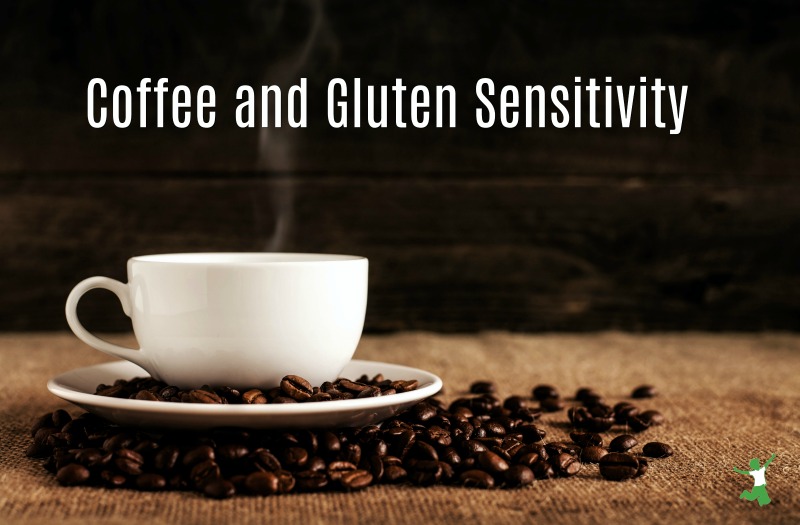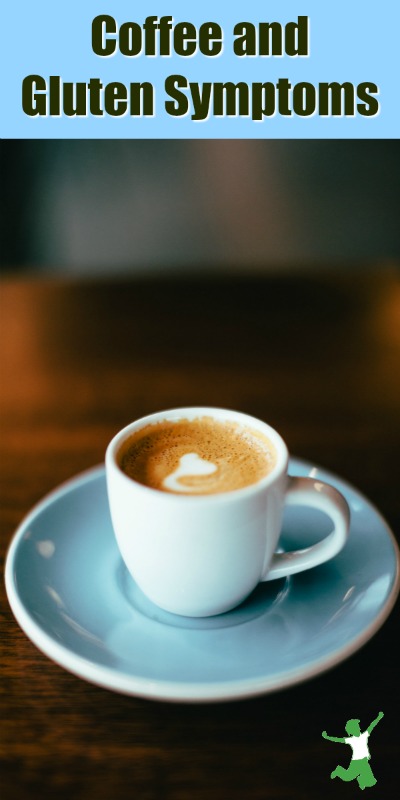Table of Contents[Hide][Show]
Coffee should be avoided by those who are Celiac and many who suffer from wheat sensitivity as it contains cross-reactive proteins to gluten.

If you drink coffee, even bulletproof coffee and have gluten sensitivity or celiac, you might want to sit down for this one.
There is a surprising connection between gluten and coffee that is by and large ignored by the health community. This revelation holds ramifications for other autoimmune disorders as well.
The problem has nothing to do with caffeine, so decaf coffee would be included in this discussion.
In a nutshell, fairly recent lab research has revealed that 10% of coffee is a protein that cross-reacts with gluten antibodies.
This means that if you are gluten sensitive or celiac and are avoiding gluten-containing grains or perhaps have even gone completely grain-free if you still drink coffee there is a strong likelihood that the protein in the coffee is triggering the very same gluten-related health problems you are trying to avoid.
In other words, even if you think you are doing fine with your current gluten-free diet, it is very possible that skipping the coffee could take your health to the next level.
Symptoms of Gluten Sensitivity
Most people who are gluten sensitive don’t realize it because gastrointestinal problems like burping, gas, tummy upset, or toilet issues are the least common way for gluten issues to present themselves!
The most common symptoms of gluten sensitivity?
Migraines and other neurological issues – even MS!
Hormone and endocrine problems are another common way for gluten issues to manifest themselves.
How Coffee Triggers Gluten Sensitivity
So what exactly happens when a gluten sensitive person eats gluten?
Folks with gluten antibodies react to any gluten in the diet by mounting an immune response. This means that gluten is perceived by the body as an invader and the gluten antibodies attack the gluten itself trying to destroy it. This gluten attack is an inflammatory response and inflammation issues can occur anywhere in the body in any tissue or organ.
Here’s the real shocker I came across when researching the coffee/gluten connection:
According to Dr. David Clark DC, functional neurologist and endocrinologist:
There’s not a disease or health condition you can think of that does not have an association – in the research literature – with gluten sensitivity.
That’s a very strong statement!
In essence then, if you are gluten sensitive in any way shape or form, and it seems that most people are whether they know it or not given the epidemic levels of autoimmune issues today, gluten antibodies have the potential to react to proteins in other foods as if they are gluten thereby triggering an immune and inflammatory response.
The protein in coffee is the most common cross-reactor for gluten. Because it is the protein in the coffee that is the trigger, switching to decaf coffee does not solve the problem. Apparently, instant coffee is the worst offender.
Is it possible to be gluten sensitive and not cross-react to coffee? Yes, it’s possible but you’ll have to do some expensive lab testing with a knowledgeable doctor to find out.

Reference
Journal of Food and Nutrition Sciences
More Information
You Probably Need to Change WHEN You Drink Coffee
Coffee Enema
Morning Coffee Fix
Caffeine and Chronic Back Pain
Healthy Coffee Substitutes








I heard of this potential connection a few months back but I then soon after heard some evidence contradicting it by a well-reputed source whom I can not just now remember precisely (may have been Chris Kresser but will try to find it and confirm). I must do some digging further on this issue. I’m not sure what to make of it but caution and monitoring how one feels is probably a wise idea.
There are so many things like this that cause issues for people with celiac or gluten sensitivity that a lot of people don’t think about. I was working with one of my GAPS clients the other day and she said she had completely gone off grains but was still having problems. She doesn’t want to give up coffee, although I encouraged her to do so or at least cut back to a great extent. We ran through all the possibilities of other foods she might be eating that are causing problems and she mentioned balsamic vinegar and I said, “bingo!” Then she said, “wow, I eat it probably several times a day because I love it so much! No wonder I am still having problems.” She didn’t know this usually contains gluten.
Ps- I don’t drink coffee. I gave it up for caffeine.
I think its a load of crap. Coffee & gluten aren’t related unless someone puts some sort of wheat ( or other gluteneous grain) in their coffee blend.
I was coffee free for 2 weeks earlier this year – while detoxing a bit. I felt pretty good once I was past the withdrawal of caffeine. I thought by drinking decaf I was safe. Maybe not. I have been drinking less – so maybe now is the time to give it up completely. Or when I run out of the 3 bags in my pantry.
Love your blog, but you just ruined my day. Boo.
NaomiBell, did you know this? I didn’t.
I love coffee but haven’t had it for over a year because of how it makes me feel. I thought it was the caffeine, but tea doesn’t affect me like coffee at all.
Oh no!
Do you think the same rule would apply to chocolate since it is also a bean?